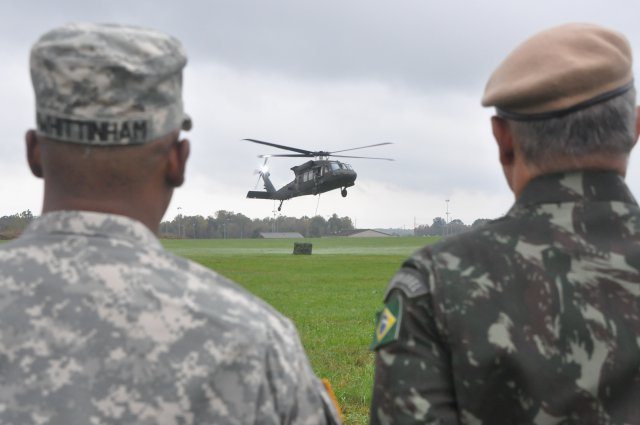When one thinks of Brazil, what may come to mind are Carnival celebrations, the beaches of Ipanema, samba dancing in the streets and arguably the world’s best soccer.
However, the South American nation also has to have a serious side in an unpredictable world.
Consequently, Brazil’s military leadership is looking for ways to better its military preparedness and leaders of their 12th Air Assault Brigade’s visit to the 101st Airborne Division this week was a major part of that plan.
“The purpose of Major General Araújo Lima and Major Mauro’s visit is to establish a center of excellence of instruction in air assault operations in Brazil,” said Capt. Michael Hill, an escort for the VIPs. “Right now, the Brazilian Army has just one air assault brigade, but no center of excellence.”
Hill said at this point, air mobile operations in Brazil are lacking support from some higher ranking military officials, however.
“The higher ranking officials have been resistant to expanding air mobile operations,” said Hill. “But, this visit is to try and help them understand that they need it and that there is going to be a greater requirement of air mobile operations in the future.”
Hill added that one of the drawbacks for the Brazilian Army at the present moment, even if hesitation from overall leadership didn’t exist, is the lack of overall aviation assets within their military, which is needed to support more air assault training.
“In order to make that happen, they need to garner support from generals and their nation’s leaders, who will have to establish a center of excellence, and in order to do that, their Soldiers would need to be trained here at the air assault and pathfinder schools,” said Hill. “Today’s visit is their first step in establishing that center of excellence in air assault and air mobile operations.”
According to Hill, Araújo Lima and Mauro’s were treated to a rappelling and fast rope demonstration Thursday morning before witnessing students at Sabalauski Air Assault School learn how to conduct sling load operations.
“They arrived October 10th in the afternoon and spent October 11th with division plans and intelligence — where we discussed air assault operations, the techniques and procedures we use, as well as lessons learned in Afghanistan and Iraq,” said Col. William Hickman, deputy commander of operations for the 101st Airborne Division. “October 12th they spent time with the Rakkasans discussing company-level operations and the lessons learned downrange. Later today they’re going to the aviation brigade to discuss the same issues and then they’ll sit down with 2nd Brigade and talk about lessons learned in small-unit operations.”
Hickman summed up the visit as “a complete look at how we conduct our air assault operations and train the individual Soldier.”
The Brazilian officers, as rain drops began to fall, paid close attention to the Sabalauski instructors and students in action on Thursday.
“In this specific case, as the commander of an air assault unit, I am here to visit another sister air assault unit in the world,” said Araújo Lima, interpreted by escort Maj. Robert Wittinham, foreign area officer stationed at the U.S. Embassy in Brasilia, Brazil. “The experience is learning from the 101st Airborne Division what they’ve learned in Iraq and Afghanistan is a great value to us.”
Araújo Lima said his visit is a way for the Brazilians to learn from U.S. so that in the future the two nations can work closer together using similar tactics and techniques.
“While our Army has never had the opportunity to actually conduct a real air assault mission in combat or in crisis, this experience is invaluable,” added Araújo Lima. “Currently, we are very proud of the work we’re doing in Haiti, however, where we have 2,500 troops on the ground, of which 800 are from my brigade.”
Araújo Lima acknowledged that there is currently no threat or missions upcoming for his unit, but also said they must be prepared in a moment’s notice.
“It is why we are here today in the spirit of cooperation between our two nations, especially in air assault operations,” added Araújo Lima. “We have to be ready to defend our nation, either from within or outside of our borders, so we have to continue to train.”
Araújo Lima may have work to do in convincing his leaders to move forward in air mobile operations when he returns to his unit in Caçapava, São Paulo, Brazil, but will leave Fort Campbell fully prepared for that mission.
“I would like to thank the 101st Airborne Division for the warm welcome and the great reception,” Araújo Lima added. “We’ve been given a wealth of knowledge and this experience has been invaluable.”










